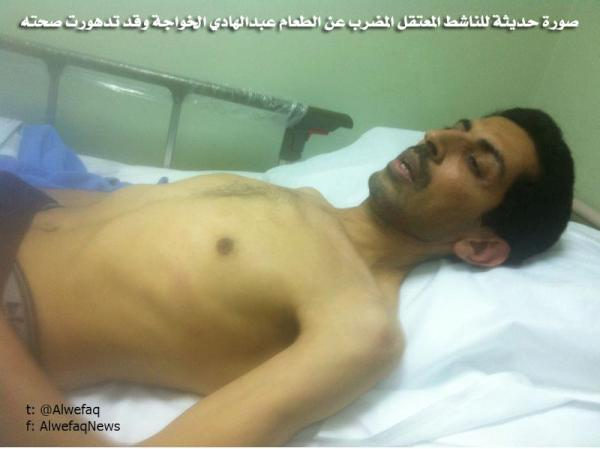Abdulhadi Al-Khawaja: Bahraini Pro-Democracy Hunger Striker to be Retried in Civil Court

Bahraini jailed hunger striker Abdulhadi al-Khawaja will be retried along with 20 opposition activists over their involvement in pro-democracy protests last year, a Bahraini appeals court has ruleed.
"The court is [ordering] that the trial take place again and that testimony from prosecution and defence witnesses be heard once more as if it is a new trial," BNA, the official news agency, said.
Khawaja, who has been on hunger strike since 29 January in protest at receiving a life sentence for his role in the protests, was visited by his wife Khadija al-Musawi after two weeks amid growing fears about his safety after his family said that that he had disappeared from his hospital bed.
Bahraini officials rejected the claims, saying the 51-year-old activist was in hospital in "good health" and receiving full medical care.
Force-fed but determined to hang on
Musawi accused the authorities of using feeding tubes and other life-saving measures on her husband against his will.
"He was very weak and dehydrated," she tweeted.
She claimed that doctors forcibly hooked up feeding tubes and IVs on him. "He woke up after more than five hours, found himself in a different room restrained, with a tube down his nose," she tweeted.
Khawaja asked the doctor for the tube to be taken out, but the doctors refused. "Hadi told him that he will hold him [the doctor] and MOI [Ministry of Interior] responsible for that. He asked not to be force-fed if something happen and they have to respect that."
But the force-feeding continued. "I asked him are you still on hunger strike? He said 'Of course. I will continue until freedom or death. No one can take this from me. What is happening to us is not right nor fair."
Prison hospital authorities said that Khawaja agreed to the life-saving measures. "His doctors asked for and received his consent," they said.
Beaten by police and sexually abused
Khawaja is one of 14 opposition activists who were arrested and jailed by Bahraini authorities in 2011 over involvement in pro-democracy protests.
He was seized in a late-night raid at his daughter's house and, according to his family, beaten by police and not allowed to take his medication with him.
The National Safety Court, a military tribunal, accused Khawaja and 20 other activists of "setting up terror groups to topple the royal regime and change the constitution". He was sentenced to life imprisonment based on a confession that he said was extracted from him under duress.
Khawaja claimed he and members of his family were sexually abused by military forces while they were in hospital. He spent seven days there blindfolded and handcuffed.
Along with the others arrested alongside him, he went on hunger strike in prison to protest against his conviction.
Denmark asked for him to be released on the grounds that he has Danish citizenship, but the Supreme Judicial Council rejected the request.
Khawaja told his family on 17 April that he had removed the intravenous drip keeping him alive. Two days later, during the Bahrain Grand Prix, he decided to stop drinking water and asked to see his lawyer to write his will. He was refused permission to do so.
His daughter, Zainab, wrote on Twitter on 20 April:
- He is completely committed to what he is doing. He has chosen this path and would do so again if given the opportunity.
- He asks that nobody attempts to go on a similar hunger strike.
- If he dies, he asks people to continue with peaceful resistance.
© Copyright IBTimes 2025. All rights reserved.






















